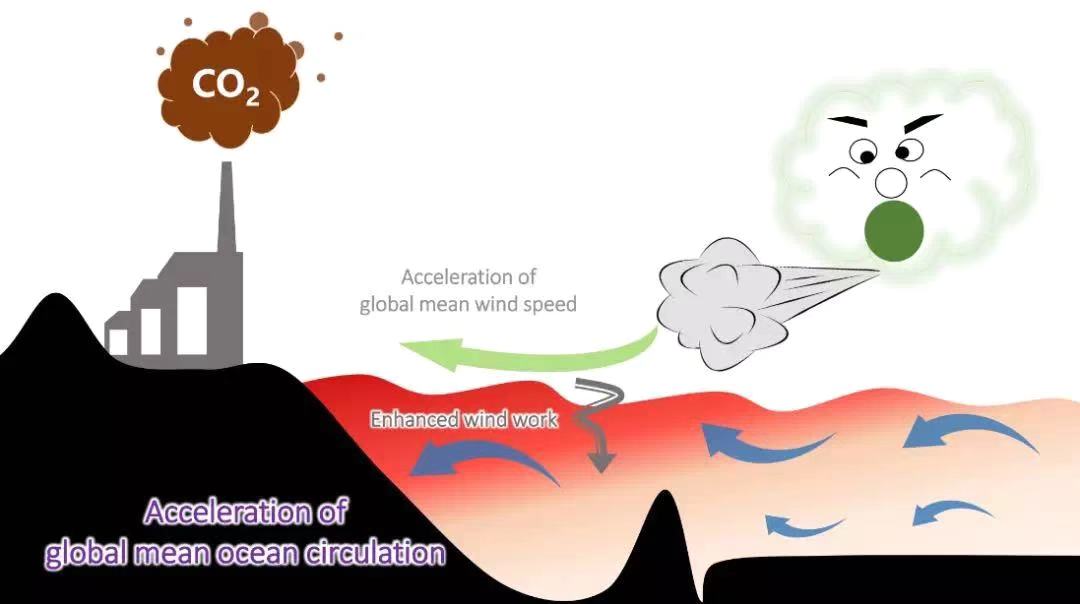Large scale ocean circulation is the main dynamic process that redistributes ocean mass and heat and plays a very important role in Earth's environment and climate system. A growing body of evidence suggests that continuous greenhouse gas emissions due to human activities give rise to Earth's energy imbalance and continuous ocean warming, as shown in the most recent Assessment Report from the Intergovernmental Panel on Climate Change (IPCC). Thus, it is essential to know the patterns of large-scale ocean circulation that set the environment for the background of global warming.
Because of internal dynamic processes and natural variability, ocean circulations in different regions have changed differently in response to global climate warming. More importantly, there is still a lack of systematic and continuous direct observations of the Earth's ocean circulation. Hence it is not well understood what the trend of the Earth's large-scale ocean circulation is under the background of climate warming. An international team of scientists from the Institute of Oceanology of CAS (IOCAS), Scripps Institution of Oceanography at UC San Diego, NOAA and CSIRO has been conducting ongoing research on this issue and has recently made significant progress recently.

Figure 1. Global distribution of linear trend of oceanic kinetic energy in the upper 2000 m layer. The red shading indicates regions with positive trends of kinetic energy (i.e., accelerating of ocean circulation) and the blue shading denotes regions with negative trends of kinetic energy and decelerating trends of ocean circulation (Credit Shijian Hu).
The study, published in the journal Science Advances, show the global mean ocean circulation has accelerated over the past two decades. The research team made use of ocean circulation and wind speed products from multiple sources, including observations, reanalysis, model assimilations and numerical simulations, to investigate the changes in the patterns of the global mean ocean circulation and global mean sea surface wind speed.
The leading author, Professor Shijian Hu from IOCAS said: “We found that oceanic kinetic energy significantly increased since early 1990s, indicating a substantial acceleration of global mean ocean circulation. The trend is particularly prominent in the global tropical oceans and reaches depths of thousands of meters”.
The deep-reaching acceleration of the ocean circulation is mainly induced by a planetary intensification of surface winds since early 1990s. Although the onset of a negative Pacific Decadal Oscillation after the late 1990s partially contributed to the changes in tropical wind and ocean circulation, the acceleration was likely additionally induced by external forcing related to continuous greenhouse gas emissions.

Figure 2. A cartoon shows the acceleration of the global mean ocean circulation. Black shading indicates the continents and seabed; red shading portrays the warming ocean; grey factory and “CO2” imply the greenhouse gas emission related to human activities; blue arrows depict the acceleration of global mean ocean circulation; green arrow implies the enhanced wind work due to the acceleration of global mean wind speed. The PDO and external forcing due to persistent greenhouse gas emissions is found to account for the acceleration of global mean wind speed and hence the acceleration of global mean ocean circulation during the past two decades (Credit Shijian Hu).
"This is quite an exciting paper. I think the results are robust, I think they’re important, and I think they are a little shocking.” Professor Joellen Russell from the University of Arizona commented on this study. An acceleration of global mean ocean circulation may lead to enhanced heat and water mass transport and the water cycle in the ocean may be intensified as well. Heat in the upper layer may be transferred into the deep ocean more efficiently due to the deep-reaching acceleration of ocean circulation. “It’s going to stimulate a lot of other work.” Susan Wijffels said, who is a senior scientist from Woods Hole Oceanographic Institution.
This work has been jointly supported by the National Natural Science Foundation of China (grants 91858101 and 41776018, 41806016, 41730534) and the Key Research Program of Frontier Sciences, CAS (QYZDB-SSW-SYS023).
Link to the paper:
Hu, S.*, J. Sprintall, C. Guan, M. J. McPhaden, F. Wang*, D. Hu, and W. Cai, 2019: Deep-reaching acceleration of global mean ocean circulation over the past two decades. Science Advances, 6, eaax7727, https://advances.sciencemag.org/content/6/6/eaax7727
IOCAS PIO: Ms. YANG Fengfan
Phone: 86-532-82898623
E-mail: fengfanyang@qdio.ac.cn
|
|

Address: 7 Nanhai Road, Qingdao, Shandong 266071, China
Tel: 86-532-82898902 Fax: 86-532-82898612 E-mail: iocas@qdio.ac.cn


